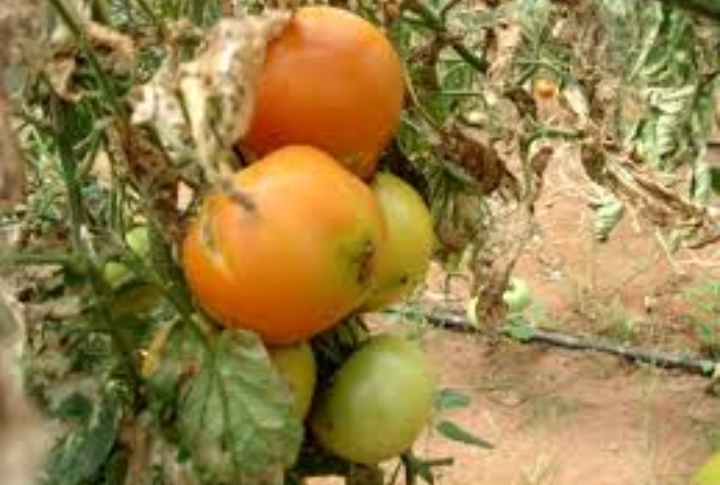A tomato pest outbreak devastates farms across Northern Nigeria, driving up prices and forcing farmers to abandon tomato cultivation
Nigeria has suffered agricultural losses exceeding ₦1.3 billion following a severe outbreak of Tuta absoluta, a destructive pest commonly referred to as “Tomato Ebola.” The infestation has ravaged tomato farms across Kano, Katsina, and Kaduna states, triggering a sharp surge in tomato prices and worsening food inflation.
The Federal Government confirmed the outbreak, describing it as a major threat to food security. Speaking at a four-day capacity-building workshop for financial institutions in Abuja—organized by HortiNigeria in collaboration with NIRSAL Plc—the Minister of Agriculture and Food Security, Sen. Abubakar Kyari, said the situation demands immediate intervention.
According to Kyari, Tuta absoluta is capable of destroying entire tomato crops within 48 hours. As a result, the price of a 50kg basket of tomatoes has soared from ₦5,000 to over ₦30,000, deepening the financial burden on Nigerian households.
> “This crisis highlights the urgent need for integrated pest management strategies, investment in resilient crop varieties, and enhanced support for farmers to safeguard our food supply chains,” Kyari said.
He emphasized the potential of horticulture—encompassing fruits, vegetables, herbs, spices, and ornamentals—as a transformative tool for rural development, job creation, improved nutrition, and economic diversification. He urged greater investment in infrastructure and sustainable financing for the sector.
Farmers Count Their Losses
In interviews with THE STAR, affected farmers shared harrowing accounts of loss and desperation.
Usman Bala, a 43-year-old farmer from Kura LGA, Kano, said he had to uproot his tomato plants and switch to maize in a bid to salvage his fertilizer investment.
> “Despite replanting with maize, I lost over ₦600,000 on seedlings, fertilizers, and irrigation,” he lamented.
In Kafur, Katsina State, 52-year-old farmer Shehu Musa Ibrahim described the outbreak as the worst he has experienced in over two decades of tomato farming.
> “I cultivated two hectares expecting a yield worth over ₦25 million, but the pest wiped out everything. I’ve now switched to maize and rice—and I won’t be planting tomatoes again anytime soon.”
TOGAN Raises Alarm Over Tomato Value Chain
The Kano State chapter of the Tomato Growers Association of Nigeria (TOGAN) confirmed the widespread impact, listing heavily affected areas such as Garun Malam, Kura, Bunkure, and Bagwai LGAs.
TOGAN Chairman, Alhaji Sani Danladi Yadakwari, noted that many farmers had already abandoned tomato farming due to the recurrent outbreaks.
> “This pest, first identified in 2016, remains a threat despite our efforts. It’s already disrupting supply to major markets, with tomato prices rising above ₦75 per unit,” he said.
Farmers and agricultural stakeholders are now urging the government to deploy coordinated emergency measures—ranging from pest control support and farmer compensation to long-term investment in research and crop protection—to save Nigeria’s tomato value chain from collapse.

